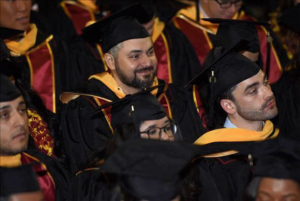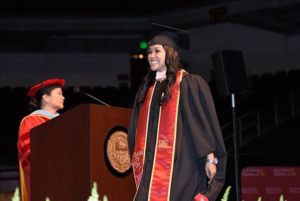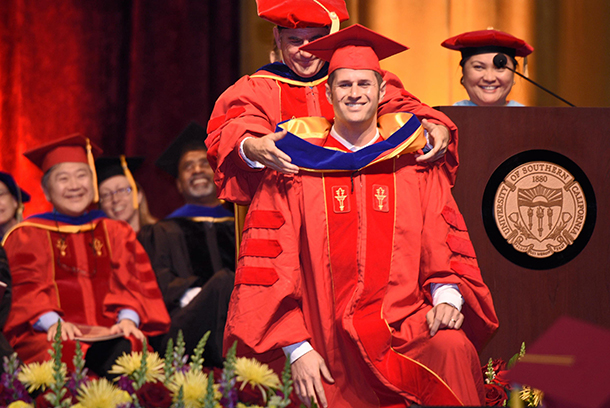For a room full of scientists and future clinicians, Mary Helen Immordino-Yang’s advice seemed slightly counterintuitive. But the speaker for the 13th Keck School of Medicine of USC commencement ceremony for PhD, Master of Science and Master of Public Health encouraged the more than 300 graduates to embrace their emotions throughout their careers.
“Aim not to distance yourself from your emotions, but to leverage your emotions as powerful motivators for change that you can wrought on the world,” said Immordino-Yang, EdD, professor of education and psychology at the USC Rossier School of Education. “The source of all inspiration, of all passion and of everything that is meaningful is its emotional connection to an underlying idea or purpose.”

More than 300 graduates received PhD or master’s degrees during the Keck School commencement ceremony on May 12. (Photo/GradImages)
While generations have believed in the idea that emotions should be suppressed in favor of level-headed intellect, Immordino-Yang said recent neuroscience research has shown the opposite to be true. She lauded the graduates for choosing professions that are dedicated to understanding and bettering the human condition, and encouraged them to let their better emotions guide them.
“What matters, what divides good from evil, is how you feel,” she told the graduates. “And I do not mean what you feel, I mean how: the process by which you evaluate and become aware, become conscious of your emotions, and of the beliefs and desires that are driving your and other people’s actions. … Learning to feel is a process by which your life and talents and skills take on meaning.”
The May 12 ceremony at the Galen Center on USC’s University Park Campus, which was presided over by Keck School Dean Laura Mosqueda, MD, and Grand Marshal Rob McConnell, MD, professor of preventive medicine, included a benediction by the Rev. Jim Burklo, MDiv, senior associate dean of religious life at USC, as well as two student addresses.
Namphuong Doanvo, who received her Master of Public Health degree, emphasized a need for the Class of 2018 to look beyond their specific areas of study to collaborate and ensure health equity for all people.
“Ask yourself, how will you give your everyday life to others?” she said. “What can you do to improve your communities and how will your work in patient care, research, the state health department or conduction of epidemiology studies, help advance medicine? However you answer these questions, you must remember to stay purposeful and focused in your endeavors.”

A master’s degree graduate walks across the stage during the Keck School commencement ceremony. (Photo/GradImages)
PhD candidate Daniel Chu, MPH, entertained the crowd with humor while also addressing some of the ways his fellow graduates can use their academic experience to change the world.
“By approaching life as learners, we become humbler,” Chu said. “We discover more about ourselves by realizing how much we know and, more importantly, in understanding how much we don’t know. In turn, we seek understanding of other experiences … as a result, we become better people.”
— Melissa Masatani


